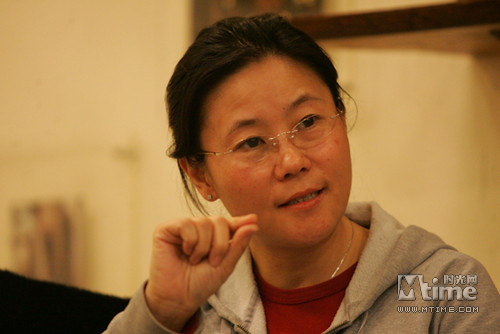Mixed reactions for proposed copyright law
- By Zhang Rui
 0 Comment(s)
0 Comment(s) Print
Print E-mail China.org.cn, August 20, 2012
E-mail China.org.cn, August 20, 2012
 |
|
Li Shaohong, the president of China Film Director's Guild, supports the second draft of copyright law. [Mtime.com] |
A second draft of China's copyright law released to the public last month proposes that multiple creative talents who contribute to films, such as directors, composers, musical performers, and screenwriters receive royalties for their work.
Under current copyright law, the copyright of a film and other kinds of productions produced in a similar way, such as TV shows, belong exclusively to the producer. Artists, writers, and directors are entitled to be mentioned in the film's credits and are paid according to their contract with producers. The new law, if approved, would allow multiple contributors to be credited as "creators," entitling them to a share of the copyright and the right to royalties each time the film or show is shown in theaters or on TV.
"The original writer, screenwriter, director, lyricist and composer have the right to collect reasonable royalties," the draft states, adding that "the main performer(s) have the right to collect reasonable royalties when their audio/video production is used by others."
However, the proposed law could prove arduous in terms of gaining approval for screenings, legal experts say. The naming of multiple artists who share the copyright could create headaches for producers and distributors, since the permission and payment of all creators would be required to show a film or broadcast a show. If one of the co-creators doesn't agree to a showing, nothing can be done.
The draft has been hotly contested by various players in the entertainment industry since its release on July 6 to obtain public feedback. As of Aug. 1, the terms of the draft are still being debated.
While the draft was welcomed by Chinese screenwriters, directors, screenwriters and other creative professionals, it was strongly opposed by producers, film executives, and investors, the Legal Evening News reported.
Li Shaohong, the president of China Film Director's Guild, said that directors should be the author of a film, and should have the rights to collect more payment than their contracts stipulate. Directors He Ping and Zhang Yang chimed in on their blogs, arguing that Spanish directors collect royalties the second time around when their films are re-released in theaters.
Wang Hailin, a famous screenwriter, also joined in, saying screenwriters should be counted as an author and therefore a co-creator. "We write the story!" he wrote on his blog. Other screenwriters, who posted anonymously, were more vitriol about their lack of royalties.
"This is my screen play. I wrote it. The director didn't write it. How can it be yours? Have you ever paid me?" One angry screenwriter wrote.
On the other hand, film company executives remain apprehensive about the new law, arguing they take all the risk when producing a film or show.
Several industry players told Legal Evening News that they will quit the film industry if the draft passes. Legal experts, meanwhile, are calling for further discussion of the royalty terms.
"Everyone can shut down their business if the draft passes," Hu Ming, vice president of Huayi Bros. Media, a Beijing-based film production company.
"The film industry is losing money ― 90 percent of films lose money. [If] we have to pay screen writers and directors again and again, it doesn't make sense for us to go on," said An Xiaofen, producer of the 2008 Hong Kong kung fu blockbuster "Ip Man".
"We don't oppose a second round of payment," He added. "But the precondition is you should share the risks with investors. Feng Xiaogang got more share when he was an investor in the blockbusters such as 'Aftershock'. However, most directors don't want to do this, they want a payment once for all."
Xu Xinming, a renowned copyright lawyer, said the draft is intended to respect and defend the interests of authors, but would be very hard to enforce.
"It will involve too many people. It will not be clear from whom screenwriters and directors should seek payment, or for how much. [If] a film cannot be easily played, involving so many people will cause harm," Xu said, adding that under current law, directors, writers and actors don't enjoy copyright, but they receive credit and in many cases are paid handsomely. Screen writers, in exception, are paid relatively low, he said.






Go to Forum >>0 Comment(s)